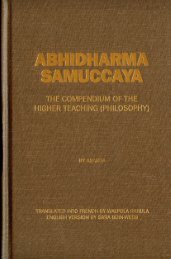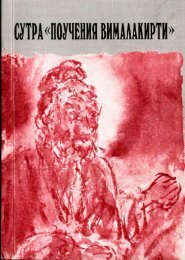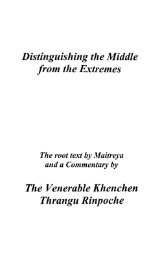ABHISAMAYALAMKARA
ABHISAMAYALAMKARA
ABHISAMAYALAMKARA
Create successful ePaper yourself
Turn your PDF publications into a flip-book with our unique Google optimized e-Paper software.
378 ANALYSIS OF<br />
five. 1 In such a sense (the mind of a living being) is an<br />
imperceptible item that does not present itself (to the<br />
different faculties of vision)- It is owing to this that (the<br />
minds) are spoken of as something which cannot be<br />
pointed to or localized.<br />
[Abhis. aloka, MS. 250b. 15-251b, ^<br />
(IV. 15d.J<br />
[Gser. IV. 74a. 6.] dpe med-pias-sam rah-gi-ho~bos<br />
stoh-pas rnam-ses-sam sems 2 bstan-du-med-pa-la de-ltar<br />
ses-pja.*<br />
13. The Bodhisattva's knowledge about the Buddha's<br />
cognition of the imperceptibility of the<br />
minds, since they are devoid of a particular essence of<br />
their own and are not amenable to any of the five special<br />
faculties of vision of the Buddha.<br />
The mind in the imputed aspect 4 is imperceptible<br />
inasmuch as it is devoid of the character of a thing<br />
in itself 3 and consequently unreal. The mind in the<br />
causally dependent aspect 6 is unreal, inasmuch<br />
as there are no (actual) causes (that produce it.) 7<br />
It is therefore something uncognizable.<br />
tion of the death and birth of all the living beings (sarva-sattva-cyutyupapatti),<br />
and the "vision of Analytic Wisdom" is characterized by the<br />
absence of constructive thought with regard to all the elements of<br />
existerce (sawa-dharma-avikalpana)' Cf. above, under acavada<br />
(Chapter I.).<br />
1 I.e. including dharma-caksuh and buddha-caksuh also. Cf.<br />
Ibid.<br />
2 *'Consciousness or the mind.** This addition has been made<br />
with regard to the word vijnana = rnam-ses which appears in the<br />
Karika. citta = vijfiana.<br />
3 Pane. III. 59b. 1-2.= A*. 264. 20-265. 2.<br />
p<br />
g<br />
5 laksana-sunyatvena. This is the same as laksana-nihsvabhavata,<br />
cf. "Doctrine of Pr.-par.", pp. 93, 94.<br />
6 paratantra=g£an-dban.<br />
1 This refers to utpatii-nihsvabhavata, cf. "Doctrine of Pr.-par."<br />
p.. 94.<br />
THE <strong>ABHISAMAYALAMKARA</strong> 379<br />
The mind in the ultimate aspect 1 is devoid<br />
of an absolute nature, in the sense that a real (separate)<br />
essence of it does not exist. For this reason it cannot be<br />
made an object of cognition. Each of these three forms<br />
is (from the Empirical standpoint) put in connexion with<br />
the three varieties of vision,, viz. that of Analytic Wisdom, 2<br />
etc. But (from the standpoint of the Absolute, the minds)<br />
cannot be representations amenable to any of the five<br />
kinds of vision and are therefore imperceptible.<br />
[Abhis. aloka, MS. 252b. 2-9.]<br />
(IV. 16a.)<br />
srfM-<br />
33 V<br />
[Gser. IV. 74b. 1.] ho-bo-hid med-paham de-bzingsegs-pahi<br />
spy an lna~la Itar mi-snan-bas sems bltar~medpa-la<br />
de-ltar-ses-pa. 3<br />
14 The Bodhisattva's knowledge about the Buddha's<br />
cognition of the minds "with opened eyes'* and<br />
with shut eyes." The "opening of the eyes" is<br />
the inclination of the mind towards its object in the sense<br />
of affirmation. "Shutting the eyes" is the absence of<br />
such an inclination towards an object and has the sense of<br />
negation.<br />
As regards the question.—Does the Buddha exist after —<br />
death or dotes he not—we have 4 .<br />
I parinispanna=zyons~grub. Cf. Bu-ston, Transl. Vol. II, p. 52,<br />
note 346a.<br />
2 prajna-caksuh. The other two meant here are : dharma-caksuh<br />
and buddha-cak.suh.<br />
3 Pane. III. 59b. 6-7.—Rabhbyor gzan-yan de-bzin~gsegs-pa<br />
dgra-bcom-pa yan~dag~par-rdzogs-pahi sans-rgyas-kyis ser-phyin zabmo~hdi-la<br />
brten-te. sems-can pha~rol dan gan-zag pha-rohgyi sems<br />
bltar-med~pa~Ia bltar-med-pahi sems etc.—Ast. 265. 4-6.—<br />
F crf%rf<br />
4 In both the Pane. (III. 60a. 3-4 sqq.) and Ast.'(268. 18-270.<br />
20.) a long passage is devoted to these different incorrect points of<br />
view which essentially refer to the existence of an individual Ego.<br />
For all these passages in detail as well as the analysis of this subject<br />
in the Gser. cf. Appendix.



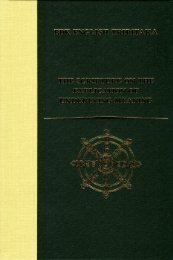
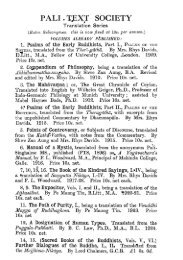


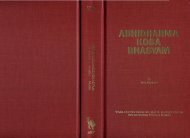



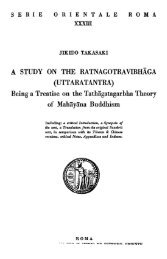
![Long Discourses of the Buddha [Digha Nikaya]](https://img.yumpu.com/32792419/1/164x260/long-discourses-of-the-buddha-digha-nikaya.jpg?quality=85)
